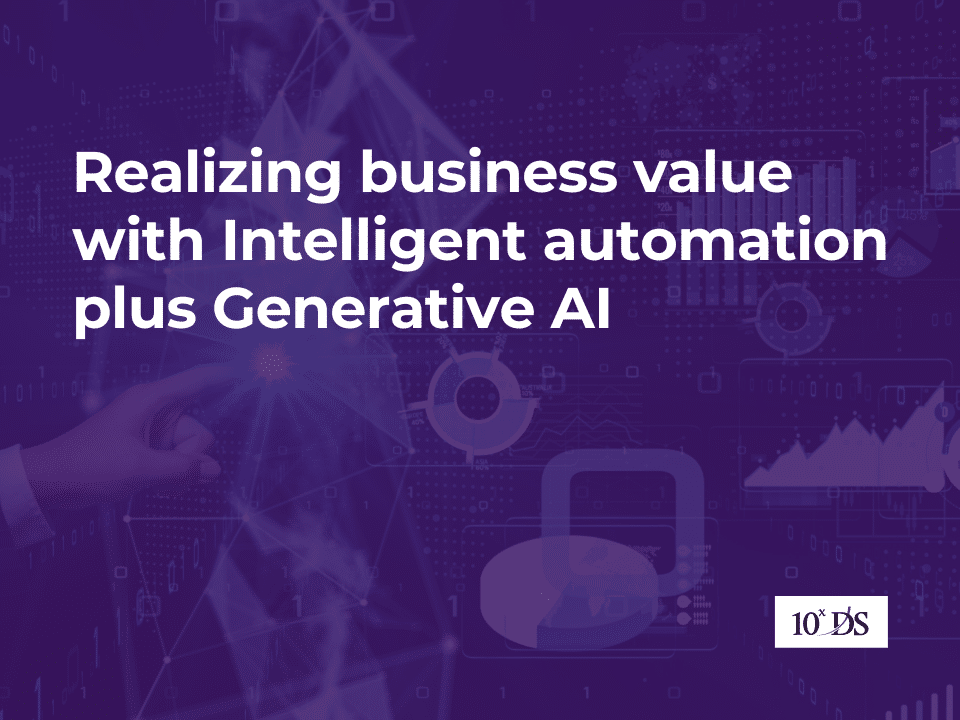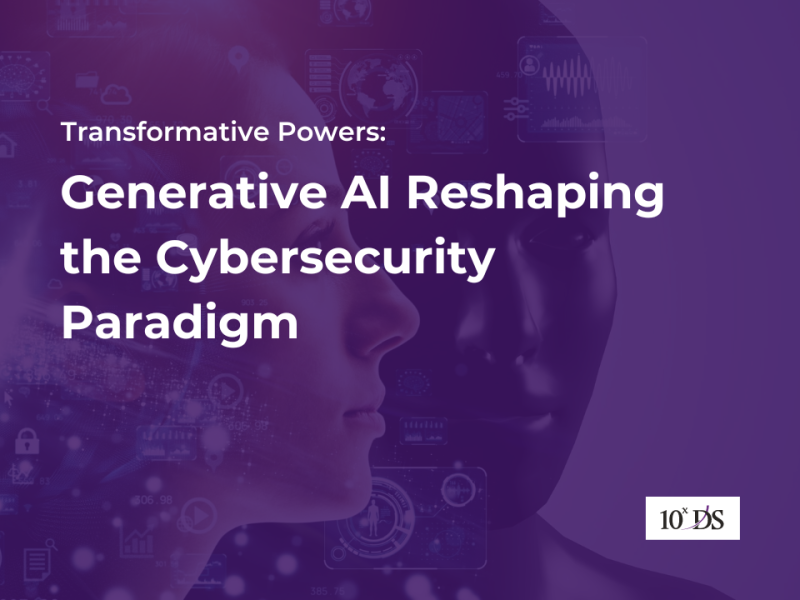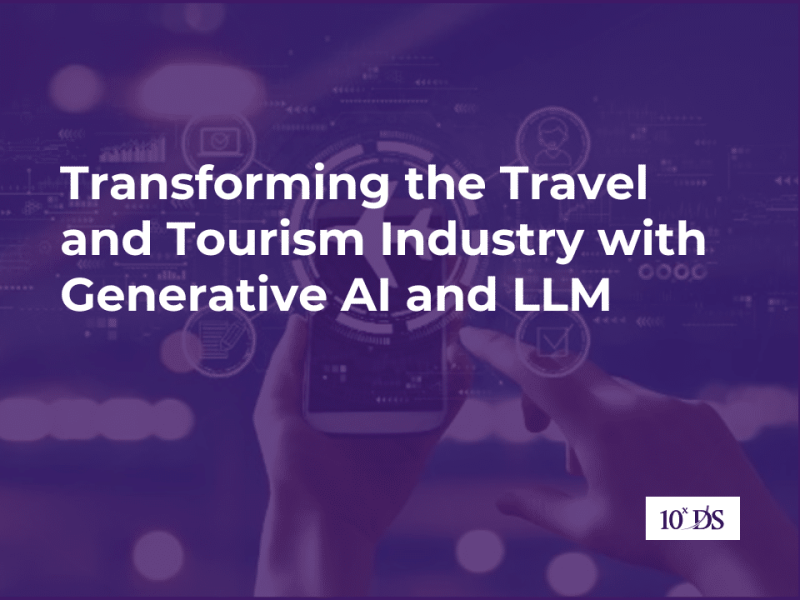
Realizing Business Value with Intelligent Automation plus Generative AI
Intelligent automation has made significant strides in streamlining processes, improving efficiency, and reducing human error. However, despite its advancements, businesses still heavily rely on human intervention for decision-making, problem-solving, and tasks that require creativity and emotional intelligence. This human dependency factor introduces bottlenecks, delays, and limitations in fully leveraging the potential of automation. The emergence of Generative AI (Gen AI) presents a transformative opportunity to address these challenges. By combining the capabilities of intelligent automation with the creative and cognitive abilities of Gen AI, organizations can further enhance productivity, innovation, and competitiveness. Deloitte CFO Signals Report (2023) suggests that 42% of companies are experimenting with Gen AI, and 15% actively incorporate it into their business strategy. Gen AI’s capacity to generate novel ideas, simulate human-like reasoning, and autonomously adapt to new scenarios reduces the burden on human workers while unlocking new possibilities for automation across a wide range of industries and domains.
Here’s how their combined capabilities can create value for businesses:
Creativity and Innovation
Intelligent automation excels at repetitive tasks but often falls short in creative problem-solving. Gen AI bridges this gap by leveraging deep learning techniques to generate novel ideas, solutions, and designs. By analyzing vast amounts of data and understanding complex patterns, Gen AI can inspire creativity and innovation across various domains, from product design and marketing campaigns to scientific research and artistic endeavors. Its ability to generate diverse perspectives and explore unconventional solutions makes Gen AI a valuable tool for organizations seeking to stay ahead in today’s rapidly evolving markets.
Adaptability to Unforeseen Scenarios
While intelligent automation is efficient within predefined parameters, it struggles with adapting to unexpected situations or handling tasks outside its scope. Gen AI’s adaptive learning capabilities enable it to continuously evolve and respond to new challenges in real-time. By learning from past experiences and adjusting its algorithms accordingly, Gen AI can navigate complex and dynamic environments with ease. This adaptability makes Gen AI well-suited for applications such as autonomous vehicles, fraud detection, and predictive maintenance, where unforeseen circumstances are common.
Natural Language Understanding and Generation
Intelligent automation systems often struggle to understand and generate natural language accurately due to the complexities of human communication. Gen AI overcomes this limitation by employing advanced natural language processing (NLP) and generation techniques. Through deep learning algorithms trained on large text corpora, Gen AI can comprehend context, semantics, and sentiment in human language, enabling more natural and engaging interactions between humans and machines. This capability finds applications in virtual assistants, chatbots, and customer service automation, where effective communication is crucial.
Complex Decision Making
While intelligent automation can perform routine tasks efficiently, it typically lacks the ability to make complex decisions that require judgment, reasoning, and contextual understanding. Gen AI enhances decision-making by simulating human-like cognitive processes, such as pattern recognition, inference, and probabilistic reasoning. By analyzing diverse data sources, considering multiple factors, and weighing trade-offs, Gen AI can provide informed recommendations or make autonomous decisions in domains such as healthcare diagnosis, financial planning, and risk management.
Continuous Learning and Improvement
Unlike traditional automation systems that require manual updates and maintenance, Gen AI is capable of autonomous learning and improvement. Through techniques like reinforcement learning and generative adversarial networks (GANs), Gen AI can iteratively refine its models based on feedback from the environment. This self-learning capability enables Gen AI to adapt to evolving circumstances, optimize performance, and discover new insights over time. By continuously improving its skills and capabilities, Gen AI becomes more proficient and reliable in various applications, driving continuous innovation and efficiency gains for organizations.
Ethical and Moral Considerations
Intelligent automation systems may inadvertently perpetuate biases or make decisions that conflict with ethical principles due to limitations in their understanding of ethical and moral considerations. Gen AI addresses this challenge by incorporating ethical frameworks and principles into its algorithms. By promoting transparency, fairness, and accountability in decision-making processes, Gen AI can mitigate potential risks and ensure responsible AI deployment. Ethical Gen AI frameworks enable organizations to uphold ethical standards while harnessing the transformative power of AI to benefit society as a whole.
Let’s explore some real-world examples of how companies are leveraging Intelligent Automation and Generative AI to create business value:
- Data Extraction and Unstructured Data Processing: extract unstructured data from PDFs, images, or handwritten documents accurately by understanding context and reducing noise.
- Data Entry and Updates: extract relevant data from customer interactions, emails, reports, and enterprise applications to keep information up-to-date.
- Customer Services: answer frequently asked questions (FAQs), provide self-service tools (like appointment scheduling or order processing), collect feedback, and handle complaints.
- Recruitment: gather resumes, screen them against job requirements, and communicate with candidates.
- Employee Onboarding: guide employees, collect necessary documents, extract data, and verify information.
- Invoice Processing: automate invoice handling by extracting relevant details, validating against rules, and updating financial systems.
- Expense Management: analyze expense reports, categorize expenses, and ensure compliance with company policies.
- Inventory Management: monitor inventory levels, predict demand, and optimize stock replenishment.
- Shipment Tracking: tracking updates and notifications for shipments improve efficiency.
- Lead Scoring and Qualification: analyze leads, prioritize them, and route them to the right sales representatives.
- Personalized Marketing: creates personalized content, such as product recommendations or email subject lines.
- Medical Image Analysis: assist radiologists in diagnosing diseases from X-rays, MRIs, and CT scans.
- Drug Discovery: designs novel molecules and predicts their properties for drug development.
- Predictive Maintenance: predict equipment failures, reducing downtime and maintenance costs.
- Defect Detection: identifies defects in manufacturing processes.
- Grid Optimization: optimizes energy distribution and minimizes losses in power grids.
Overall, the integration of intelligent automation and Gen AI offers a powerful synergy that unlocks new possibilities, drives business value, and accelerates the pace of digital transformation across industries. That forms the basis of Gartner’s prediction that by 2026, more than 80% of enterprises will have used Gen AI APIs or deployed Gen AI-enabled applications in production environments, up from less than 5% in 2023. While adoption is high, managing Gen AI-related risks still seems to be in the early stages of mitigating the risk of inaccuracy. By harnessing their combined capabilities, organizations can position themselves for success in the evolving landscape of the Fourth Industrial Revolution.
Talk to our experts to learn more.

